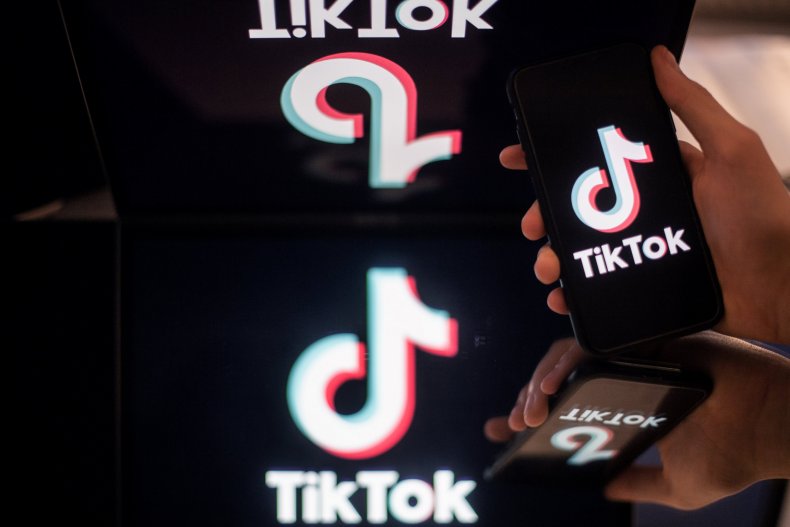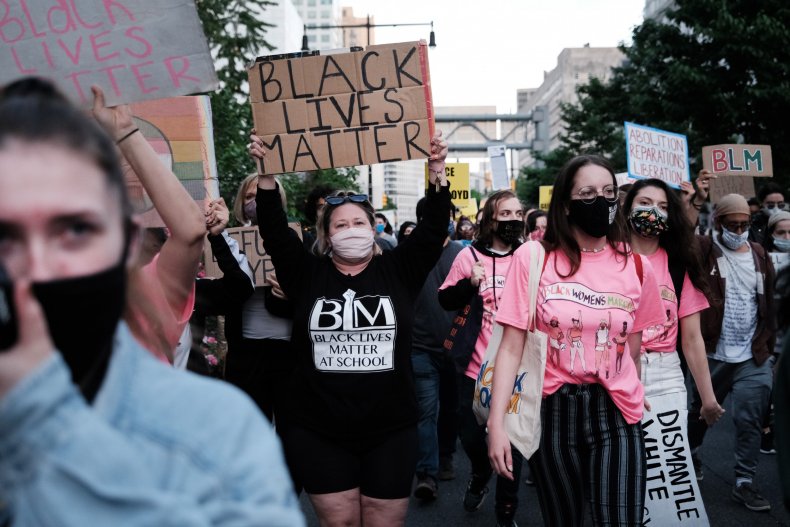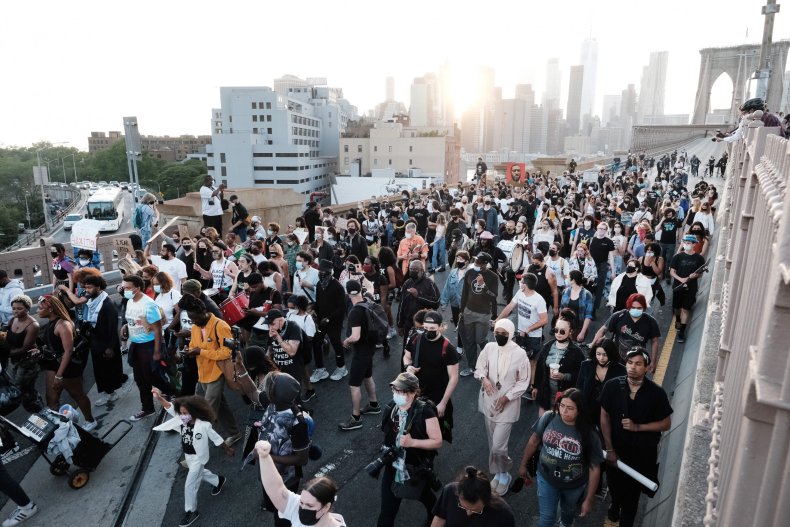JACOB JARVIS
Videos of teenagers dancing or miming along to music is what springs to mind for most people when they think of TikTok, the social video sharing app that has taken younger generations by storm.
From harmless trends to more dangerous ones—such as the recent "fire challenge" which left at least one participant hospitalized—the power to influence Generation Z through the platform is clear.
But TikTok's memetic power isn't confined only to the digital space. Raucous parties in the U.S. that were coordinated on TikTok demonstrate the platform's formidable ability to inspire the gathering of large crowds in a short period of time.
In a febrile political atmosphere, this function offers TikTok's impassioned activists an organizational tool to spark the kind of swift, unpredictable, and chaotic street protests that are a challenge for authorities
Just look at the parties for a hint of that. In May, a teenager's birthday party nicknamed "Adrian's kickback"—a hashtag viewed more than 407 million times on TikTok—drew some 2,500 attendees to Huntington Beach in California, according to reports.
The event was scheduled for Saturday, May 22, with an invite posted online the Tuesday before. Party details were posted on TikTok and went viral. The ensuing gathering became what The Guardian described as a "scene from Animal House"; The New York Times called it the "biggest thing on the internet."
It was declared an unlawful assembly and a curfew was imposed as authorities moved to shut it down. Local police arrested 149 people amid the anarchic scenes.
Similar events pulling in hundreds of attendees have come in the aftermath. Around 500 people gathered in Hampton Beach in New Hampshire on May 26 after word of a party spread on TikTok. Three days later, a crowd gathered in Alki Beach, Seattle, for an event similar to Adrian's Kickback. Police had to break it up.
TikTok's power to trigger sudden protests has already begun to happen outside of the U.S. Offline political activity is tipped to increase around the world as nations lift COVID-19 pandemic restrictions and ease social distancing guidance.
"If you observe, content creators can create trends on the platform fairly quickly," Nuurrianti Jalli, assistant professor of communication studies at Northern State University, told Newsweek. "I strongly believe TikTok can assist content creators to quickly gather people, quickly organize a protest, quickly spread information to the public."
Jalli pointed to several examples of TikTok facilitating protest. "In Southeast Asia, people used TikTok to express political opinions, and later such dissent transformed into movements that led to offline protests," Jalli said.
"This happened in Indonesia during the Omnibus Law protests in 2020, Malaysia in 2021, Thailand during the Youth Protests in 2020, and Myanmar Military Coup Protests early this year."
TikTok has similarly had political influence in other nations. In Russia, for example, the platform was used to rally support for protests backing arch Kremlin critic Alexei Navalny after his arrest in January.
Russia took issue with some of this content, branding it unlawful, which led to the platform removing a number of the videos brought into question.
As the pandemic forced people indoors, online expression and communication have expanded out of necessity, and so political discourse has grown on TikTok. With the easing of restrictions, this digital activism has the potential to transfer offline.
"I think that like what happened in the aftermath of other pandemics we will see quite a bit of social activism coming back to the streets," Paolo Gerbaudo,
senior lecturer in digital culture and society at King's College London told Newsweek.
The pandemic has created a "backlog" for activists, he suggested, and its devastating impact has given rise to new grievances.
 A picture taken on January 21, 2021 in Nantes, western France shows a smartphone with the logo of Chinese social network TikTok. The social video-sharing app has huge potential for organizing instant large-scale protests.LOIC VENANCE/AFP VIA GETTY IMAGES
A picture taken on January 21, 2021 in Nantes, western France shows a smartphone with the logo of Chinese social network TikTok. The social video-sharing app has huge potential for organizing instant large-scale protests.LOIC VENANCE/AFP VIA GETTY IMAGESJames Dennis, senior lecturer in political communication and journalism at the University of Portsmouth, U.K, told Newsweek that younger people have become more politically engaged online during the pandemic and groups may try to capitalize on this.
"Research has shown increases in online forms of political engagement due to COVID-19 and the associated lockdowns, especially amongst younger citizens," said Dennis, who wrote Beyond Slacktivism: Political Participation on Social Media.
"As the restrictions are lifted, I think TikTok will continue to be used for political expression. Political organizations will be trying to use this as a gateway to a wider range of political activities, including traditional forms of protest.
"While there are difficulties in getting citizens to commit to a cause, TikTok has already shown that it can be a powerful tool for mobilizing citizens to take political action."
Bart Cammaerts, professor of politics and communication at London School of Economics and Political Science, told Newsweek the world was already primed for an increase in protest activity even before the health crisis.
"We have to remember that we were experiencing a high cycle of protest and contestation on a global scale before the pandemic hit," Cammaerts said, referencing Gilets Jaunes in France, Chile's anti-neoliberalism protests, Hong Kong's pro-democracy movement, and the global Extinction Rebellion climate protests.
"However, the tensions, conflicts, issues that lay at the basis of all these protests have not suddenly gone away, on the contrary even. The pandemic has served as a pressure cooker and it would not surprise me that we will witness another global cycle of protests as resistance once restrictions are lifted."
Cammaerts said COVID "has justified unprecedented levels of state intervention in the everyday life of citizens and high levels of repression, as well as the squashing of basic civic rights and dissent, both in liberal democracies and authoritarian regimes.
"In the latter, dictators and authoritarian leaders have also abused the pandemic to further weaken their opposition and consolidate their position.
"This means that a lot of frustrations, grievances, and struggles have been suppressed, but these will inevitably re-emerge with a vengeance once the restrictions have been lifted."
As previously reported by Newsweek, police departments across the United States are preparing for potential clashes tipped to break out amid widely anticipated protests this summer.
And TikTok could be at the center of the inception of demonstrations, used to gather people rapidly and boost attention and attendance as they take place.
Cammaerts described the "appropriation" of TikTok by activists as an example of the "social shaping" of technology. This is where users adapt a piece of technology's features to their own ends and in creative ways not always intended by the developers.
"Put very simply, Facebook or TikTok was not necessarily designed or conceived to mobilize for direct action by activists, but the affordance to do so was very much there and became in a very short time the dominant way in which activists and movements communicate, organize and mobilize," Cammaerts said.
The use of TikTok follows a historical precedent of activists using new means of communication to further their causes, triggering corporate and political powers to respond with restrictions on that activity.
"As a result, we can observe from past to present a cat and mouse game between activists and corporate as well as political power, whereby ways are creatively being sought to circumvent restrictions, to bypass regulations, and find new ways of communicating.
"I would thus see the use of TikTok by activists in that light."
TikTok may be particularly conducive to protest because of its algorithm and the style of content its users can create.
"The algorithm allows for a wider audience range, and its 15-60 seconds format can be impactful with the possibility of global virality," Athina Karatzogianni, professor in media and communication at the University of Leicester, U.K., and the principal investigator of DigiGen, a research project looking at how young people are impacted by technological transformations, told Newsweek.
"People under 30 are the main users and they are more and more finding their political
voices this pandemic year, with global protests challenging racial, social, and environmental injustices and inequalities, while demanding more power, participation and democracy in their countries and in the world as a whole."
 Black Lives Matter supporters and others march across the Brooklyn Bridge to honor George Floyd on the one year anniversary of his death on May 25, 2021 in New York City. Racial justice is a major focus of the TikTok generation.SPENCER PLATT/GETTY IMAGES
Black Lives Matter supporters and others march across the Brooklyn Bridge to honor George Floyd on the one year anniversary of his death on May 25, 2021 in New York City. Racial justice is a major focus of the TikTok generation.SPENCER PLATT/GETTY IMAGESInés Pousadela, a senior research specialist at CIVICUS, a non-profit organization dedicated to strengthening citizen action globally, agreed that TikTok is especially good at spreading content far and wide.
"TikTok's structure appears to make it more effective to disseminate information farther because the content that users see on their newsfeed is less dependent on who they follow, compared to Twitter or Facebook," Pousadela told Newsweek.
"The purpose of the app is not really to create strong connections or 'friendships' but rather weaker connections among higher numbers of people who tend to be more diverse, as they don't need to have much in common to become connected.
"This is what allows information (in the very palatable form of short videos) to travel faster and farther, and what has turned the platform into an effective tool to open up conversations and set opinion trends."
The video-focused format of the platform is another reason TikTok can boost protests—both through promoting them in advance and then spreading awareness in real-time as they happen.
"Protests, in particular, are one form of political action that we know has been enhanced by the speed and reach of social media," Cristian Vaccari, professor of political communication at Loughborough University, U.K., told Newsweek.
Vaccari said the video content could "become increasingly useful both to encourage participation in protests and to document what is happening at protests, including displays of unity, sizes of the crowds attending, key messages supported by the participants, and reactions by both supporters and opponents, possibly including over-reactions by the police which often lead to increased visibility and popularity for some protests."
Ioana Literat, assistant professor of communication, media, and learning technologies design at Columbia University, told Newsweek that TikTok is mobilizing people to protest indirectly by raising its visibility and social status.
Literat said TikTok is "depicting protests as something achievable and personally relevant (via showing your peers and role models engaging in protest activity), not something abstract and distant as media representations might imply."
She continued: "TikTok facilitates a sense of approachability in a way maybe other platforms don't. If you see a protest video posted by someone you admire, and is somewhat in your network, that's very powerful.
"It makes the feeling personal. It's huge when we're talking about civic engagement, when someone posts, 'This is my first time at a protest,' that is so important. They [TikTok users] see that, 'This is some like me, this is my peer,' and they're thinking, 'I can do this.'
"It really taps into people's agency."
Francesca Vassallo, associate professor of political science at the University of Southern Maine, where she set up a minor in social media activism, emphasized the effect popular social media personalities can have on their followers.
"Today's youth listen a lot more to encouragement to participate politically on social media than in the media for sure," she said.
"It is the person who is posting that makes the difference and grabs their attention. If you follow someone you respect on social media platforms, any post from that person can have a very strong influence."
TikTok's suite of creative video tools can also boost protests by helping activists to promote "the side of protests that is not really shown," Literat said, casting them in a positive light.
Literat also highlighted that those involved in pro-Trump protests and MAGA rallies—as well as the Capitol riot—utilized TikTok, too: "Often when we talk about protests, we think about counterhegemonic protests. There's also a lot of protests on the other side."
The platform's potential for use in protest is "already happening," Literat said. One example is TikTok users trying to impact turnout at Trump's Tulsa rally last year by encouraging people to sign up for tickets in advance and then not attend.
Cammaerts said for "digital natives" there is less of a distinction between online activism and more traditional forms of protest.
"I personally think that we should maybe stop constructing a strict dichotomy between online and offline, and have a moralistic judgment which denotes online as somehow less important and lazy compared to offline activism," Cammaerts said.
"What we see empirically that especially for digital natives that distinction is not made as strict and the online does flow into the offline and the offline again generates more engagement and self-representation online."
Pousadela, of CIVICUS, also pointed to the use of TikTok for digital activism and said the platform facilitated this because it is "already a space that young people were using for a variety of purposes in their daily lives."
"At a time when virtual organizing became more important than ever because real-world activism was not always possible due to lockdown measures, and when hundreds of millions of newly mobilized young people sought an outlet to express their views on social issues that mattered to them, including climate change and systemic racism, nothing felt more natural than turning to those tools that they had been using for other purposes, where they were connected and were already having these conversations, and which they mastered to perfection," Pousadela said.
But Vassallo played up the efficacy of physical demonstrations and reiterated TikTok's potential to organize them. "I think that after many marches and street demonstrations in the wake of George Floyd's death, for instance, the protest experience from the past two years has highlighted how physical activism makes a difference," Vassallo said.
"Online activism can help with the organization, but it is the repeated street presence that makes people think and remember more. My sense is that people feel they made a more important contribution by being in a specific place at a specific time, rather than talking about something online."
Vassallo added: "A TikTok video may go viral and have an impact, but soon enough it will be replaced by another new viral video and the original video will be forgotten and/or become irrelevant. There is no pride in claiming you watched a TikTok video, but watching it can convince a person to come out and march on the streets."
TikTok is already having a political impact. The prospect of its influence growing in the future seems predetermined. "Unless there is a major structural change to TikTok, we would see more of this in the near future," Jalli said.
 Black Lives Matter supporters and others march across the Brooklyn Bridge to honor George Floyd on the one year anniversary of his death on May 25, 2021 in New York City. Protests have been rampant worldwide in recent times, and as lockdown restrictions ease further demonstrations focused on a raft of causes are anticipated worldwide.
Black Lives Matter supporters and others march across the Brooklyn Bridge to honor George Floyd on the one year anniversary of his death on May 25, 2021 in New York City. Protests have been rampant worldwide in recent times, and as lockdown restrictions ease further demonstrations focused on a raft of causes are anticipated worldwide.
No comments:
Post a Comment